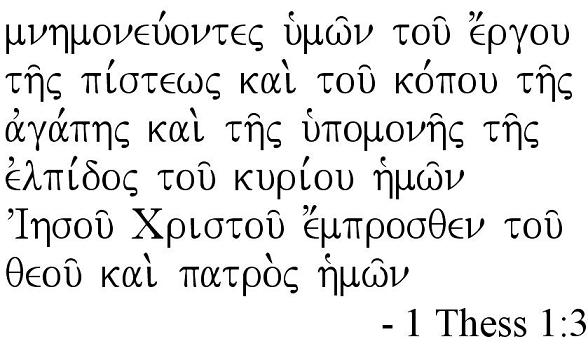1 Thessalonians 1:3
 Here is the promised post. And make sure you read the previous before venturing into this, OK?
Here is the promised post. And make sure you read the previous before venturing into this, OK?Admittedly, for a NT research student my grasp of Koine Greek is pretty dubious. For those of you who know your Greek, the truth of my honesty will become apparent in the following. For those without much Greek, however, it may all sound hugely impressive ... but even more hugely boring. So whether you know Greek or not I guess I don't really win with this post.
But the problem is, when one ventures into academic NT exegesis, a bit of Greek tends to come in handy. And so this is a question really for all of you Greek boffs out there.
What is the relation of the objective genitive in 1 Thess 1:3 ('tou kuriou hmwn Ihsou Xristou') to the lengthy object of the sentence (starting with umwn, working through the triad of faith, love and hope)? Is the objective genitive modifying just the 'hope', or also the 'faith' and 'love'? This question, while considered in earlier commentaries, has gone out of fashion in modern works. That the objective genitive modifies just 'hope' is simply assumed. But is this assumption correct?
Leon Morris, one of the few more modern scholars to at least raise the question, states:
‘It is not absolutely clear whether we should take “in our Lord Jesus Christ” with “hope”, or, as Neil, for example, does, with the whole of the preceding, including the work of faith and labor of love’.[1]Here are some reasons, against the (albeit silent) modern scholarly consensus, to follow the line of thought represented by Neil (whose work on Thessalonians I sadly don't have access to). First, the triad of 'faith, hope and love' occur together regularly in early Christian writings. That this is so suggests that the objective genitive may modify all of the preceding, given their natural association with one another. Second, the umwn that begins the ‘lengthy object’[2] of the sentence is dependent on ergou ... kopou and upomonhς. This 'object' culminates in the appearance of the objective genitive, and thus suggests that tou kuriou hmwn Ihsou Xristou relates to the entire 'object'.
Furthermore, the reasons I've found in commentaries against Neil's position fail to fully convince. For example, Morris makes the suggestion that the objective genitive relates only to ‘hope’ because the phrase ‘before our God and Father’ must also be read to do so.[3] However, such a reading of this phrase is deeply problematic, and I prefer to see it as related to the opening participle (mnhmoneuonteς), as most commentators do. The main reason given against Neil's reading is that the focus on just ‘hope’ in Christ sits very comfortably with the rest of the letter that has the eschatological events centred around Christ very much to the fore. And Christ is not tied to faith or love in 1 Thess, so the argument goes. However, while Paul doesn’t speak of love toward Christ in this letter explicitly, the idea is arguably present. And while Paul does speak of the object of faith in 1:8 as God, the entire third chapter will demonstrate how faith is expressed by whether or not the Thessalonians are ‘standing firm in the Lord’ (3:8).
Another potentially more problematic argument (not found in any commentaries) against reading the objective genitive as modifying all three elements of the ‘lengthy object’, is that Chrysostom reads it automatically as only referring to ‘hope’ (cf. my post on Silva's GF principle for a discussion on such reasoning).
So, what does the jury say? Is the objective genitive modifying just 'hope', or the entire triad?
And if you have managed to finish this post without killing yourself in bored desperation, then congratulations. If you found it interesting, as I did, then you should probably be a bit worried.
--------------------
[1]Morris, The First and Second Epistles to the Thessalonians, (Michigan: William B. Eerdmans, 1991), 42.
[2]to use the language of Earl Richard, First and Second Thessalonians. Sacra Pagina Series Vol. 11 (Minnesota: The Liturgical Press, 1995), 46.
[3]Leon Morris, The First and Second Epistles to the Thessalonians, 42, esp. fn. 24.












3 Comments:
What can I say, Chris? My expectations about this post were very high indeed -- "can he really write the world's most boring post?" I asked myself. But you didn't let me down one bit.
If only there were more posts like this, we would't even need television to numb us with boredom. ;-)
Chris, I think the concern with how these themes play out in the rest of the letter has more weight than you are giving it here. This is not simply a (stereo)typical Pauline triad--these three themes govern Paul's expectations of how the Thessalonians are doing and Paul's response to the recent news from Timothy as to how they are doing.
This initial statement in 1:3 represents Paul's memory (mnhmoneuontes) of the Thessalonians' reception of the missionary message (a hugely important matter which Paul reminds them of in chs. 1-2). Then when Paul describes his response to Timothy's report he does so in these terms. Tellingly, Timothy brings back good news of the Thessalonians' faith and love, but not hope (3:6). Their ongoing faith, as you note, is evident in their standing firm in the Lord (3:8), though there is still room for growth in this area (3:10). Their ongoing love, indeed the "Godtaught" nature of it, is evident in the love they have for one another (4:9-12; cf. 4:6), though they should abound in this even more. Of the three core virtues Paul remembers from the initial Thessalonian reception of the missionary message, only hope is missing--they are grieving as those without hope in the face of the death of loved ones in the community (4:13).
In view of this, to understand what Paul means by "faith, hope, and love" in 1:3, one must look to the way Paul explicates these themes in the rest of the letter. Faith and hope are, as you note, focused toward the Lord Jesus in the rest of the letter. However, love is not, but it is explicitly described in terms of brotherly love. Thus, I would favour the idea that the genitive phrase in 1:3 only qualifies the "hope," even though in terms of broader Pauline theology the concepts of faith and love toward God/Jesus can certainly be found.
Against my better judgment, I'm going to respond to this post, though I must warn that its been awhile since I've looked at 1 Thess. First, while my Greek is similarly rather rusty, it does seem that the objective genitive is dependent upon the preceding lengthy object. Second, the triad does play a major role (especially hope) in Paul's development of the letter, as M. Pahl notes.
I wonder if Paul is not here doing something similar to what he does in his introduction to the letter to the Philippians (and possibly other letters as well)? I'm thinking in particular of 1:9-11 where Paul prays that their love might grow, yet latter indicates that there is an absence of love within the congregation (4:2-3).
In short, I think both of you are on the right track. [I'm betting P. Obrien, Introductory Thanksgivings, would have some helpful info.]
Great post, bw.
Post a Comment
<< Home